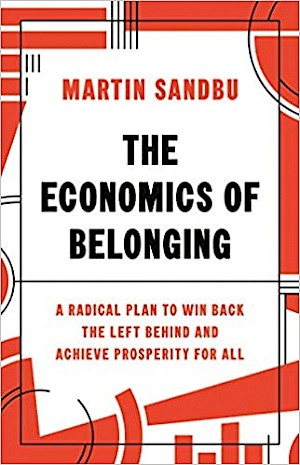23 July 2020
The Economics of Belonging:
A Radical Plan to Win Back the Left Behind and Achieve Prosperity
Martin Sandbu
2020, Princeton University Press, 296 pages,
ISBN 9780691204529
Reviewer: Matt Whittaker

Aptly enough given the subject at hand, many economics books are prone to a fundamental trade-off: they are either well written or they are full of great thinking. Thankfully, Martin Sandbu falls into that rare class of author who can combine the two. His latest offering, The Economics of Belonging, is an accessible, compelling and timely read.
The basic argument is straightforward and familiar. The combination of technological disruption and economic deregulation that we have experienced over recent decades in advanced economies has led to a growing divide across individuals and across places that has opened the door to dangerous populism. If economic and political centrists want to close that door then they must develop their own ‘radical plan’ that restores an economic tide that lifts all boats. The answer doesn’t lie in fighting populists at their own protectionist game, Sandbu argues, but rather in presenting an alternative that celebrates globalism by making it work for all.
In this well-researched but eminently readable book, Sandbu both provides a forensic description of how we ended up here and sets out his own version of the radical plan needed to move forward.
The book was written pre-pandemic, but the diagnosis remains unaffected by recent events. And arguably, the inevitable economic downturn prompted by the crisis and the appetite for establishing a recovery in which we ‘build back better’ means Sandbu’s case for action both takes on greater urgency and might find more fertile ground in which to grow.
The problem statement Sandbu presents is not without its flaws. It doesn’t say enough, for instance, about UK exceptionalism: in relation to the absence of a declining labour share over recent decades, in relation to the record level of employment recorded ahead of Covid-19’s arrival, and in relation to strong apparent growth in measures of personal wellbeing since the financial crisis. But it is nevertheless persuasive.
And the specific solutions he proposes – from more active macro demand management to a universal basic income, and from wealth tax reform to an emphasis on ‘place sensitive’ policy – are certainly ambitious. Rightly enough, that means sensible people will debate the merits of each intervention. And there are again important omissions: around the need for strengthening the third pillar of civil society for instance, rather than simply focusing on the market and the state. But his overarching argument about the need for more inclusive growth should be one that the overwhelming majority of moderates find themselves nodding along to.
But in some ways this exposes a central problem with the book. It’s not clear precisely who the intended audience is. Centrists will be easily convinced by the arguments set out, and many will already be occupying broadly the same intellectual space. Populists will no doubt recognise but reject the narrative for their own, familiar reasons. Members of the left behind themselves – to the extent that they pick the book up at all – will likely be suspicious of what feels like an attempt to sneak more elite metropolitan values in through the back door.
Ultimately, Sandbu’s radical plan only works if the right politician can pick it up and craft a narrative around it that convinces voters buffeted by a decade or more of living standards stagnation that there is a better way. Unless, of course, those politicians already in power choose to pick up the baton. To that end, it is worth noting that the book begins by citing the example of Franklin D. Roosevelt’s New Deal. The fact that Boris Johnson chose the same reference point in recent weeks highlights the potential appetite that exists for reigniting that flame of centrist radicalism. But, as the Prime Minister’s package proved all too clearly, there is often a sizeable gap between rhetoric and reality.
In the end, economists can only do so much of course. It is not Sandbu’s job to describe how the policy package he presents can most effectively be sold to the public.
And perhaps the most important message coming out of the book is its case for optimism. Rather than viewing the general economic malaise of the last decade and the specific challenges being faced by the left behind as inevitable consequences of globalisation and capitalism, Sandbu highlights the considerable level of autonomy countries retain over their destinies. We could, and should, have done more in the past to protect the left behind from the shifting economic backdrop; and we could and should do more going forward.
The book therefore serves as a good antidote to the fatalism that too often pervades discussions about inequality and our current political morass. In many ways it recaptures the ‘yes we can’ spirit of the Obama political campaign, and reminds us that the key to providing a viable alternative to populism is to ensure that a more centrist approach holds out the offer of hope to all members of society. If only because hope is something we could all do right now, this is a book well worth reading.
